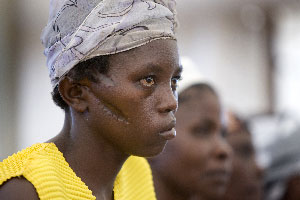Violence Against Women
Source: UNDP
On some days Espérance Nibigira, who is 35 years old, wonders how she is going to find the energy to begin the day. A combatant in the north-west of Burundi during the civil war that raged between 1993 and 2005 and resulted in 300,000 victims, she suffered an accident on the battlefield that left her disabled and suffering from amnesia.
 Having returned since 2009 to her village of Bwayi, in the province of Cibitoke, this widow and mother of three has tried gradually to return to a normal way of life but her physical and intellectual capacities have been undermined and the money that she was given on her demobilization has only enabled her to obtain essential goods. Unable to work in the fields so as to provide for her family´s needs, Espérance decided to join a community solidarity project that has been launched with assistance from the United Nations Development Programme (UNDP) and with the financial support of the Japanese government.
Having returned since 2009 to her village of Bwayi, in the province of Cibitoke, this widow and mother of three has tried gradually to return to a normal way of life but her physical and intellectual capacities have been undermined and the money that she was given on her demobilization has only enabled her to obtain essential goods. Unable to work in the fields so as to provide for her family´s needs, Espérance decided to join a community solidarity project that has been launched with assistance from the United Nations Development Programme (UNDP) and with the financial support of the Japanese government.
In order to facilitate their efforts to take their rightful place within society and the economy, 1200 women who were members of 60 associations in the provinces of Cibitoke, Bubanza and Bujumbura were given small herds to raise as a community. Goats, sheep, pigs and poultry were distributed to them in accordance with a system of rotation based on the mutual gift of livestock among beneficiaries.
Not having access to land and being ineligible for microcredit, Espérance is waiting impatiently, with the other participants of the community project, to receive her livestock animals. "I am hopeful that one day a project such as this one will rescue me from poverty. The 4 goats which I may be receiving will be a tremendous blessing for me," she says confidently.
The project is aimed at strengthening access to food of sufficient quality and quantity yet is also intended to promote social cohesion among former combatants and the inhabitants of villages through training with regard to approaches and techniques for the raising of livestock, market gardening, in addition to the organization of workshops on group dynamics and conflict resolution.
The provincial governments will help the women's associations by providing them with land to raise their cattle. Other agencies, in charge of the communal development service, will supervise the women's efforts by monitoring the rate at which the livestock population increases. The provincial representative of the former combatants, Alphonse Zigaba, welcomes this initiative: "Women represent the cornerstone of the prosperity of the household. If women are provided with assistance, this will facilitate efforts to promote family development and all of society will benefit as a result."
